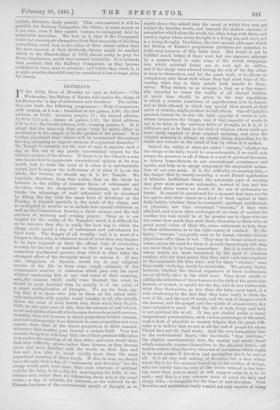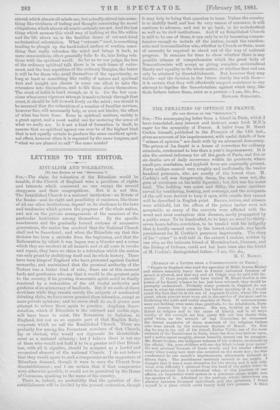RETREATS.
IN the Daily News of Monday we read as follows :—" On Wednesday, the .Bishop of Exeter will receive the clergy of his diocese for a day of retirement and devotion.' The invita- tion sets forth the following programme :—Holy Communion, with sermon, at 8 a.m.; breakfast at the palace, 8.30; the first address, at 10.30; morning prayer, 11; the second address, 12.30 to 1.15 p.m. ; dinner at palace, 1.30; the third address, 2.30 to 3.0; the fourth address, 3.30; evening prayer, 4. It is added that the intervals that occur may be spent either in meditation in the chapel, or in the garden of the palace.' It is further stipulated that silence will be maintained throughout the day, excepting as regards subjects of a spiritual character.'" Dr. Temple is certainly not the sort of man to appoint such a 'day as this out of any purely conventional respect for the .clerical opinion of his diocese. If there is in the Church a man who knows how to appreciate conventional opinion at its true -worth, how to make the most of it when it is substantially sound, how to expose the hollowness of it when it is, on the whole, the reverse, we should say it is Dr. Temple. We conclude, therefore, from this notice, that on the whole he 'believes in the utility of common times of retirement and devotion, even for clergymen as clergymen, and that he thinks the advantage of such retirement will be increased by filling the day with the same kind of devotions as the 'Sunday, if adapted specially to the needs of the clergy, and .so multiplied in number as to include four special addresses as well as the Communion Service, a short sermon, and the full ;services of morning and evening prayer. Deep as is our respect for the reality of Dr. Temple's mind, it is difficult for us to conceive that this is really the best way in which the ,clergy could spend a day of retirement and refreshment for 'their work. The danger of all worship—end it is most of a
• -danger to those who, in whatever mood of mind they may happen to be, have imposed on them the official duty of conducting %worship for the rest of mankind—is that it may lapse into a .somewhat mechanical process, from which it often takes the strongest effort of the strongest minds to redeem it. If any one, clergymau or layman, would try in any religious service of his life to form some rough estimate of the 'comparative number of sentences which pass over his mind without awakening him to any real sense of their meaning, • and,, the number which really come through the mind, he mould be more doubtful than he usually is of the value of
• ft great multiplication of liturgies. We are far from say- ing that it is those who join in them at the rarest inter- vals compatible with regular social worship at all, who usually • throw the most of their hearts into them when they do join. 'Still, we are quite sure of this, that the amount of real refresh- ment and spiritual benefit which 11. man derives from such services, certainly does not increase in direct proportion to their number, and not unfrequently does diminish in some proportion not very 'remote from that of the direct proportion to their number, whenever that number goes beyond a certain limit. Very few earnest clergymen will deny that one of their greatest difficulties is to realise the meaning of all they utter ; and none would deny that that difficulty grows rather than lessens, as they become more and more familiar with the words on their lips, and less and less able to recall vividly more than the most 'superficial meaning of those words. If this be true, we should 'have thought that a day of " retkeinent and devotion" for the
• clergy would need, even more than such intervals of spiritual Test for the laity, to be a day for unwrapping the folds of cus- tomary acts, rather than for rehearsing those acts in the usual ,order,—a day of solitude, for instance, so far relieved by de- liberate fractures of the conventional mould of thought as to startle those who attend into the mood in which they may get behind the familiar words, and beneath the shallow currents of association which alone the words too often bring with them, and reach a region where every thought is a living act, and every act is a living thought. Doubtless, the four special addresses which the Bishop of Exeter's programme promises are intended to fulfil some purpose of this latter kind. But would it not be fulfilled much better, if there wore but one vigorous attempt by a master-hand to undo some of the verbal wrappings into which spiritual forms are so very apt to stiffen, and if the clergy were advised during the rest of the day either to keep to themselves, and let the yeast work, or to choose as companions only those with whom they had most hope of dis- cussing what was in their minds with benefit to them- selves. What strikes us as strange, is that on a day especi- ally intended to renew the reality of all clerical routine, so much time Should be given to the very repetitions in which a routine numbness of apprehension is to be feared, and so little allowed in which any special blow struck at that spirit of routine, might produce its full effects. One of Carlyle's greatest lessons for us was the fatal capacity of words to sub- stitute themselves for things, and if that capacity of words is apt to be fatal in the ordinary fields of thought, as it is, it is still more apt to be fatal in the field of religion, where words are - most easily emptied of their original meaning, and even the original meaning is always an elastic thing, depending for its depth and volume on the mind of him by whom it is spoken.
Indeed, the utility of what are called "retreats," whether for the clergy or the laity, would be unquestionable, if we could only ensure the presence in all of them of a sort of spiritual Socrates, to deliver home-thrusts to our conventional ccnseiences and spirits, and help us to gauge adequately the suspended anima- tion of our own souls. It is the difficulty of ensuring this,— the danger that by merely securing a more liberal application of hitherto ineffectual ritual, the automatic part of worship may grow more and more automatic, instead of loss and less so,—that alone makes us doubt of the use of systematic re- treats. It cannot be questioned for a moment that men are far too apt to sink their minds as a kind of fixed capital in their daily habits, whether these be nominally spiritual, intellectual, or physical, nor that occasional "retreats," if they were effectual, and not so often exchanges of one form of routine for another less real, would be of far greater use to those who are not aware how much they need them, than even to those who, at great moral crises of their life, crave retirement to help them in their deliberation as to the right course of conduct. By the latter, " retreats " are pretty sure to be found, whether clerical physicians offer them or not. They may be found almost any- where, and as the need for them is at such times deeply felt, they are most likely to be found somewhere. But it is exactly those whose minds are most benumbed by the spell of constant routine, who are least aware that they need such interruptions of the automatic life they lead ; and for them "retreats," were they really vivifying, would be invaluable. We greatly doubt, however, whether the clerical organisers of these institutions are at all fully alive to the chief need. They think chiefly of calling the attention of their hearers to the drift of the particular lessons, or gospel, or epistle for the day, and do not realise that what they themselves, no less than the laity, most want, is a rude awakening to the fact that they have really in them the sort of life, and the sort of needs, and the sort of dangers which the lessons, and the gospel, and the epistle of almost every day were intended to meet. Half the life of both clergy and laity is not spiritual life at all. It has got choked under so many insignificant punctualities, such various potterings of the mind, such a host of physical or mental fidgets, that the great diffi- culty is to believe that we are at all the sort of people for whom Christ died and St. Paul wrote. And the very formalities dear to the ecclesiastical heart,—the inevitable "dear brethren," the slightly sanctimonious tone, the mental and moral drawl which naturally express themselves in the physical drawl,—all tend to send to sleep the very elements of our nature which ought to be most awake, if devotion and. meditation are to be real at all. It is all very well talking of devotion, but a man whose whole life is for the moment locked up in the surface crf things, who can hardly take in, even of the words uttered in his hear- ing, more than just so much as will suggest what he is to do next,—and this is a very common state of mind for laity and clergy alike,—is incapable for the time of real devotion. True devotion and meditation imply a mind not only capable of being
stirred, which almost all minds are, but actually stirred into some- thing like vividness of feeling and thought concerning its moral obligations, which almost all minds certainly are not. And the last thing which arouses this vivid way of looking at the life within and the life above us, is the familiar drone of cut-and-dried ecclesiastical exhortation. What " retreats " need, is something tending to plough up the hard-baked surface of routine, some- thing that really refreshes the mind and brings it back, as mere conscientious effort generally fails to do, into living rela- tions with the spiritual world. So far as we can judge, the less of the ordinary spiritual talk there is in such times of retire- ment, and the less repetition of the ordinary liturgies, the better it will be for those who avail themselves of the opportunity, so long at least as something like reality of nature and spiritual tact and insight are shown in some one effort to take the retree.ters into themselves, and to lift them above themselves. The crust of habit is hard enough, as it is. On the few occa- sions when some vigorous attempt is made to break through that crust, it should be left to work freely on the mind ; nor should it be assumed that the reiteration of a number of familiar services, however fine, will necessarily help, or even not hinder, the effect of what has been done. Even in spiritual matters, variety is a great agent, and a most useful one for restoring the sense of what we really are. Is it not a kind of formalism in itself, to assume that no spiritual agency can ever be of the highest kind that is not equally certain to produce the same excellent spirit- ual effect, however often it is repeated by the same tongues, and "what we are pleased to,call " the same minds P



































 Previous page
Previous page